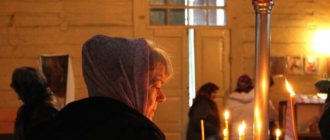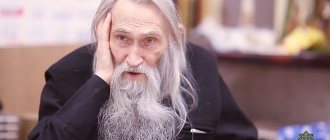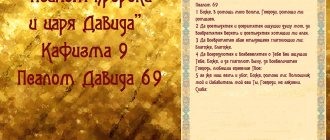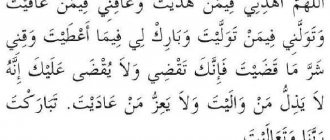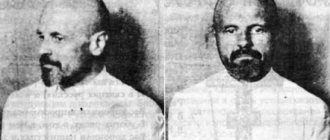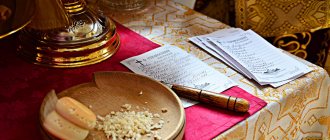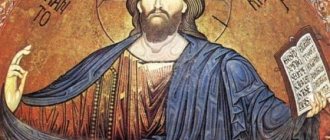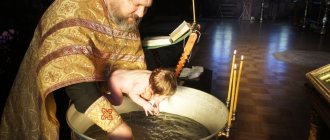What excuses are we asking for? Difficult places of the All-Night Vigil
Deacon Mikhail ASMUS, translator and teacher at PSTGU, analyzes several phrases from the beginning of the All-Night Vigil. Some of them seem quite simple, but they provide an opportunity to touch upon various issues of church life - for example, whether the most ordinary parishioner can sing along with the choir at a service.
"Rise up!"
"Get up!" - with these words the All-Night Vigil begins, because usually everyone came to the temple in advance and waited for the start of the service while sitting. The monastic charter assumes that each person has his own place in the temple. In Greek monasteries these are “stasidia”, special chairs with high backs and armrests. The statutory (i.e., complete, according to all the rules) service is quite long, and at certain moments a person in the stasidia can stand simply or with support on the armrests; half-sit on the raised seat (there is a special shelf there); finally, sit completely on the lowered seat (while reading kathismas, proverbs, teachings, etc.). The lack of seats is a distinctive feature of Russian churches.
The tongue of angels and the tongues of men
Every now and then during the service you can hear the Hebrew word “Alleluia”. It means in translation “praise God”: “allel - praise”, “Ya - God”. This is not a word in the language of angels, as is sometimes said in Sunday schools, but a completely human call to praise God just as the angels praise. This call appears frequently in the Book of Psalms. For some Psalms, mostly of laudatory content, this call became a refrain, because the Psalms are hymns. When translated into ancient Greek, the refrain “Alleluia” was left without translation, and in Christian worship it was generally extended to the entire Psalter. The reading and singing of any group of Psalms ends with a glorification of the Holy Trinity: “Glory to the Father and the Son and the Holy Spirit, now and ever, and unto ages of ages. Amen" and the chorus: "Alleluia, Alleluia, Alleluia: glory to Thee, O God!" (three times).
Everyone sings!
What prayer is most often heard at worship services? "Lord have mercy!" It is included in the most popular, so to speak, element of worship - the litany ("litany" - a series of short prayer requests). The content of litany petitions touches on the most important aspects of the life of every Christian (peaceful life, forgiveness of sins, God’s gracious help). The enhanced (i.e., intensified) litany begins with the words “Rtsem all!” - “let's say everything!” This is a call to all those who pray. A deacon or priest pronounces some kind of petition, to which the singers, and ideally all the people, respond with the simplest prayer: this or “Lord, have mercy!” once, or “Lord, have mercy!” three times, or “Give it, Lord!” In response to the call to entrust oneself to God, people answer: “To you, Lord!”
In public worship everything is meant to be spoken aloud. The fact that some priestly prayers have become “secret”, that is, they are pronounced only by the priest and from them we hear only the final phrases, “exclams,” is a feature of the development of Christian worship, and not at all a law of the genre. Initially, these prayers were not created for silent pronunciation. Because prayer is either praise or request. When people gather together to pray, they praise together or ask for something together. During a general worship service, asking for something of your own, personal, which you do not want your neighbor to know about, is not entirely appropriate. Of course, when we remember our loved ones at the Liturgy, everyone remembers his own people close to him and prays for some of his needs, but these are moments specifically stipulated by the very rules of the Divine Service. There, for example, the priest has a note in the book: “... and remembers those whom he wants by name.” Or in response to the exclamation of the priest “First remember, Lord, the great lord and father of our Patriarch...” the people answer: “... and everyone and everything.” This refers to “all Christian men and women” for whom everyone present is currently praying. This is probably the only moment when the thoughts of those praying can diverge slightly in different directions, when everyone remembers their own private needs.
There is no prohibition on laity singing during services. Constantinople worship was organized in such a way as to attract people to singing as much as possible. In particular, the performance of the Psalms antiphonally, that is, with a chorus, is the invention of precisely this public, nationwide Christian worship.
Naturally, the more complex the musical repertoire is played in the temple, the more difficult it is for people to participate in communal singing. But performing the litanies, as a rule, is within the capabilities of any more or less literate person. If a person standing in a church is very ashamed of his voice or lack of hearing, then he can sing it very quietly, almost to himself, so as not to embarrass those standing next to him.
His Holiness Patriarch Alexy, in his address to the Moscow clergy several years ago, called for nationwide singing to be introduced in parishes. And he even specifically indicated that it is very good if the Eucharistic canon at the Liturgy is sung by all the people.
Creator and creature
Every Saturday at Sunday Vespers we hear the great prokeimenon: “The Lord reigns, clothed with beauty... for He established the universe, which cannot move.” "Prokeimenon" is translated as "prominent, standing in front" and means the singing of a selected verse from a Psalm as a refrain to one or more verses of the same Psalm. We know several types of prokeimnas in worship, which are sung to different motives - in Church Slavonic, “glases”.
“He reigned, clothed himself, established” is the past tense of the Slavic language, which denotes an action completed in the past: “He reigned, He clothed himself, He established.” “Does not move” is the future tense. “That which does not move, that which does not move, will not change.” The universe “does not move,” since it will exist according to the law that the Lord created for it. There is no force in the Universe itself that would change the law of its existence. This is generally the meaning of the biblical attitude towards the world as the creation of God. The main antithesis of “The Creator and the Creature” is that the creature has no independence in determining its fate. And in this sense, man differs from all other creatures precisely by this god-like ability to independently determine his own life line, to choose the path to God or the path to destruction.
How can you learn to make excuses?
In the prayer “Vignify, O Lord,” sounded at the All-Night Vigil, there are the following words: “Teach me by Thy justification...” In modern language, the word “justification” has acquired a purely legal character: when there is some kind of suspicion and a person is freed from this suspicion, it means he is “justified.” But in the Slavic language the word “justification” corresponds to the Greek word “dikeoma”, which also means “righteousness” and “commandment of righteousness”. Righteousness is truth, rightness. The fact is that the Old Testament ideas about righteousness are strictly related to the Law of God, to the fulfillment of the Law. Naturally, a person who does what is right, in accordance with the Law of God, is called a righteous person. It is this rootedness in the Law of the Lord that is in this case the subject of prayer - the literal “teach me Your commandments about righteousness” means for us: “teach me rootedness in Your Law, teach me to do the right thing, as Your Divine Law prescribes” - the Law, of course , not the Old, but the New Gospel Law of love.
Drawings by Vera Makhankova
– How to understand the petition: “Teach me, O Lord, by Thy justification”? After all, making excuses, humanly speaking, is not good. What does “the justification of the Lord” mean, how can I learn this?
– The Ancient Patericon describes a case when one girl sinned with a young man and carried a child, but she blamed it on a hermit who lived not far from this settlement. The demon taught her. She probably came to despair because she had sinned, transgressed honor, transgressed the commandments of God, and lost the Holy Spirit. Then she apparently began to rush around and went so far as to slander the hermit - a holy man. And when the whole village gathered to see him, people began to insult him and say: “We thought that you were a holy man, but it turns out that you are what you really are! And if you have dishonored a girl, now take her and raise her child.”
And this hermit did not make excuses, he took it and began to work for this young woman. And when the time came for her to give birth, she endured great sorrow in terrible agony. Through these torments, she came to her senses and admitted that she had slandered an innocent person. It was not the hermit who justified himself, but God who justified him. Blessed art thou, Lord, teach me by Thy justification (Ps. 119:12) - this is not a situation where you prove that you are good, that you are right, that you did not want anything bad, pride is still mixed in here. And when a person completely releases the situation to the will of God, then God justifies him. He may remain slandered before people all his life, but before God he is among the angels.
Recently I told the sisters of our Iveron Monastery the life of Nektarios of Aegina. This is the saint whom all of Greece reveres. Probably in Greece at the present time he is one of the most famous and beloved saints; they pray to him most of all. A huge temple was built in his honor, just very huge, and his relics rest there. Nectarius was slandered by church envious people. He was slandered, and, being a metropolitan, he lived like a simple monk, sometimes he did not even have enough money to buy bread, he went hungry for three or more days. But even this was not a sorrow for him. And the sorrow was that he, innocent of anything, was slandered and humiliated through the envy and hatred of church people. And this was during the last thirty years of his life. And until his death, he never received the pulpit, did not receive justification for himself. And he was found innocent only after his death. A year after his death, one benefactor decided to donate a beautiful tombstone to Nectarius’ grave. The grave was opened, and when the coffin was opened, the body of the saint turned out to be incorrupt. And not only incorruptible, myrrh flowed from him, and on his chest lay living lilies, which the nun sisters placed in the coffin during burial. The sisters took these flowers as a blessing to their cells, but within an hour they withered. That is, by nature they should have disappeared long ago, but in the tomb they were preserved against nature, because the saint lived above the natural, by grace, and therefore he had such an honor.
Here you are saying that it is not good to make excuses as a human being. Of course, it’s not good, because when we make excuses, we have an argument. And when a person himself is not justified, then God justifies him. This is what the Lord's justification means. When it is not you who justify yourself with some arguments, weighty words, but God begins to justify you.
Archpriest Sergius Baranov
Original text and lyrics of the song Blessed art thou, Lord, teach me by thy justification:
Blessed art thou, O Lord, teach me by thy justification.
The angelic council was surprised, in vain it was imputed to You as the dead, but the mortal, Savior, destroyed the fortress, and raised Adam with itself, and was completely freed from hell.
Blessed art thou, O Lord, teach me by thy justification.
O disciples, you dissolve the message of peace with merciful tears; Shine in the tomb An angel spoke to the myrrh-bearing women: you see the tomb and understand, for the Savior is risen from the tomb.
Blessed art thou, O Lord, teach me by thy justification.
Very early the myrrh-bearing women went to Thy tomb, weeping, but an Angel appeared to them and said: weeping is the time of the end, do not weep, but cry out the resurrection of the apostle.
Blessed art thou, O Lord, teach me by thy justification.
The myrrh-bearing women from the world came to Your tomb, O Savior, weeping, and the Angel spoke to them, saying: Why do you think of the living with the dead? For God has risen from the grave.
Glory…
Let us worship the Father and His Sons and the Holy Spirit, the Holy Trinity in one being with the Seraphim calling: Holy, Holy, Holy art thou, Lord.
And now...:
Having given birth to sin, the Virgin, you delivered Adam, and you gave joy to Eve in sorrow. Having fallen from life to this direction, God and Man became incarnate from You.
Alleluia, Alleluia, Alleluia, glory to Thee, O God (3).
Lesson on the topic – In the light of the Bible
Sermons Classes
Warning
: Invalid argument supplied for foreach() in
/home/h911254154/allvanity.com/docs/lessons.php
on line
68
- Angels for Christmas 5vol., p. 533
- Beware 3vol., p. 453
- Russian nation 9t., p. 274
- Carelessness 3vol., p. 459
- Gratitude 4t., p. 472
- God of this age 3v., p. 474
- Divine service 3vol., p. 484
- Water 1t., p. 583
- Ascension 3v., p. 497
- Magi and Stars 5 vol., p. 717
- Sunday afternoon 5v., p. 538
- Time. Don't be late! 3vol., p. 509
- Come all to Christ 5v., p. 544
- Entry of the Lord into Jerusalem 6v., p. 634
- Choice of friends 1t., p. 593
- Reprimand him 2v., p. 672
- The sower went out to sow 6v., p. 640
- Eyes 3v., p. 530
- Guests 1t., p. 609
- Thunder and lightning 5t., p. 548
- Let the walls be built 6v., p. 645
- Day of Peter and Paul 6v., p. 668
- Boldness 5v., p. 553
- Boldness and daring 4t., p. 490
- Debt 5t., p. 558
- Interrogation 1t., p. 625
- Spiritual ministry 4v., p. 500
- Harvest 5v., p. 565
- Oblivion 5t., p. 571
- Will 2v., p. 711
- Earth 4t., p. 512
- Banner 3vol., p. 540
- For His mercy endures forever 5v., p. 592
- Tools and household items 5t., p. 596
- Execution (personally to losers) 1 volume, p. 637
- Book and writing 5t., p. 507
- Bell 5t., p. 625
- Conflicts 3vol., p. 545
- Bones 3v., p. 568
- Nettle 3t., p. 572
- Beauty will save the world 2v., p. 722
- The Cross and Exaltation of the Cross 3 vol., p. 578
- Buying and selling 3 vols., p. 586
- Procession of the Cross 1 volume, p. 654
- Love of God 4v., p. 520
- Love for Sheep 6v., p. 663
- People and Trees 4 vol., p. 526
- Mathematics 4t., p. 535
- Prayer 5v., p. 637
- Sea 3vol., p. 596
- Hope at sea? 5t., p. 647
- Inscriptions 5 vol., p. 652
- Punishment 3v., p. 609
- Anesthesia 4t., p. 546
- Teach us Your justifications 5v., p. 667
- I won’t say more 3v., p. 624
- Accident 5t., p. 672
- Now You are releasing Your servant 5v., p. 678
- About marriage 1 volume, p. 666
- About labor 1t., p. 681
- Communication with God is bliss 5v., p. 68
- Explanatory 5t., p. 689
- Construction grounds 5t., p. 698
- Hunting 3vol., p. 630
- Security 3t., p. 635
- True patriotism 4 vol., p. 553
- Letters 4t., p. 563
- Suspicion 5v., p. 574
- Obedience 5v., p. 727
- Loss 3v., p. 640
- Orthodoxy and paganism 3 vol., p. 646
- Premonition 2v., p. 694
- Transfiguration 4v., p. 588
- Transfiguration - “like a man” 2 vol., p. 702
- Transfiguration 1 volume, p. 699
- Come closer to Me! 6t., p. 682
- Habit 3v., p. 656
- Come, let us worship... 6v., p. 689
- Make friends 6t., p. 697
- Nicknames 4v., p. 597
- Psalm 103 – evening 6v., p. 710
- The Path of the Righteous 5v., p. 731
- Bees 1t., p. 713
- Disassembly 4t., p. 610
- Heaven and Hell 3 vol., p. 671
- Matchmaking 3vol., p. 679
- Repentance 1t., p. 725
- Revision 2t., p. 600
- Jealousy 6v., p. 717
- Parents and Children 3vol., p. 695
- Nativity of Christ 5 vol., p. 703
- Nativity of Christ 5t., p. 711
- Christmas 6v., p. 735
- Who will you mess with, 4t., p. 623
- Self and Anger 3vol., p. 700
- Freedom 9t., p. 288
- Freedom 2t., p. 641
- Rumors 4t., p. 631
- Laughter 9t., p. 298
- Your look, Lord! 9t., p. 310
- Dog 4v., p. 638
- Spies 3vol., p. 687
- Sun 9v., p. 319
- Neighbors 3vol., p. 709
- Compassion 3v., p. 719
- Preservation 3vol., p. 719
- Salvation 4t., p. 655
- Dispute, quarrel 4v., p. 669
- Quarrel 9v., p. 331
- Elements 9t., p. 340
- Hospitality and heredity 3 vol., p. 704
- I will teach you the fear of the Lord 9 vol., p. 347
- Judgment and Condemnation 4v., p. 677
- Telephone 3t., p. 729
- Transport and travel 9t., p. 349
- Trinity 4v., p. 689
- Toilet 4t., p. 697
- Vanity 4v., p. 706
- Dormition 2v., p. 630
- Master and Worker 2t., p. 649
- I want and need 4t., p. 715
From the book - Lapkin I.T. “…With an open eye”, vol., p.
Psalm 119:12
Blessed art thou, Lord, teach me by thy justification
The third in our nature, in particular, the house for the commandments, is the God-taught mind. Teach, let me understand, impart the ability to act, let my mind know the commandments and everything related to them, and see how in which case I should act, so that my mind can be a light illuminating the paths of life and a faithful guide along them; especially please that in my mind there be no shaky hesitations or presumptive opinions, but that everything is based on unshakable convictions.
Teach excuses, or commandments. When they act, you can only pay attention to the commandments; but when they want to know the commandments, then they cannot limit their gaze to the commandments alone, but must certainly survey the entire area of truth, so that the commandments in the mind do not hang on anything, or are not poured into it like sand, incoherently, but enter as a necessary element into the composition of truth and were combined with it in a living union so that it was impossible to touch one without shaking the whole.
In Christianity, the paths of life are illuminated by the truths about the Trinitarian Deity, Creator and Provider, about the fall, about God’s good will to restore the fallen, about the descent of the only begotten Son of God to earth in the incarnation, about His accomplishment of our salvation through His suffering, death, resurrection and ascension, about the sending of the Divine Spirit on the holy apostles, who established the Church of Christ on earth and established the sacraments in it for the sanctification by grace of all believers, and, finally, about the resurrection, judgment and future bliss of the faithful and the indescribable torment of the infidels. All these truths are the same for the spirit as air is for the body. Just as air, accepted by the lungs, passes through the entire body in the blood and enlivens everything, so these truths, being acceptable to the believing mind, pass through the entire composition of spiritual life and enliven everything in it. This life originates from them, is guided by them, and sees its end in them.
Spiritual life begins with the consciousness of fall and the inability to rise oneself. This leads to repentance and cleaves to the Lord as the only Savior. Hence the vow and determination to be faithful to Him and to wage an irreconcilable struggle against everything that rebels within and that is encountered outside that is contrary to what the Savior requires of us. Hence the hope that, despite the weakness of our nature, the Lord will lead the believer through all temptations and will finally lead him into His eternal Kingdom. Hence patience and merciless work on oneself in purifying oneself and correcting what is faulty in oneself, so that in everything one can present oneself as a shameless worker. Hence the belief that, having suffered in this way to the Lord, they partake of His bright belly here too, although still in the beginning and in the foreshadowing. All this follows from the basic truths of Christianity and forms the basis of a godly life. This is the essence of our Christian justifications, and from here, finally, the entire system of Christian commandments develops.
They will say: “Who doesn’t know this and what does prayer teach?” – But there is naked knowledge, purely intellectual, which never rises beyond conjectural views, and there is living, vital knowledge, in which every truth is as solid as confidence in its existence. This property is imparted to him by a living conviction, which even death itself does not shake. Praying to teach, the prophet asks that the Lord make all truths, both theoretical and practical, so akin to his being, so that he cannot doubt his existence even an inch, so that he can never allow in himself even a shadow of doubt about these truths. . This is the strength of a godly life. Just as you can’t walk on a thin, swaying board, because you’ll get dizzy and fall; This is how you can’t lead a life due to someone who constantly has assumptions in their head: “Come on, isn’t this how it should be? Isn't it better this way? Why, this is how it’s possible!” And whoever, having completely wavered in some truths, thinks in his own way to arrange a life pleasing to God, is like a person who, when building a house, places rotten crowns between healthy crowns. From the outside, such a house appears both new and strong, but in fact it is already doomed to fall; just like life is like this only in appearance it is good, but it already carries its own condemnation. Thus, this is the essence of petition! The Prophet asks that there be no hesitation in him, but that he walk among these truths, like that man who, going out into the street, feels that there is earth beneath him and that he stands firmly on it, and that everything around him is there, there is also the sky above him, and it cannot occur to him that there might not be something in all this. But how does the prophet ask for this after he has already hidden the words of the Lord in his heart and leads all his undertakings according to the commandments, seeking the one Lord? It is impossible to act in this way without knowledge, which he asks for only now. - But even in those good skills of his, in conducting all affairs and undertakings according to the commandments and in love for them, did he suddenly become established? When he began to work for the Lord, he had neither one nor the other; Realizing the necessity of this, of course, he prayed: “Lord, let me conduct all my affairs according to the commandments! Lord, incline my heart to love the commandments!” The Lord heard his prayer and granted him what he asked for. There he expresses what he achieved at the end of his work, and here he points out what happens at the beginning of the search for this good - knowledge with conviction. He seems to suggest: “I said, I sought, I hid...”, but no one would have thought that it suddenly happened like this - no, it was preceded by work and prayer. Things went as I will express them now in relation to the acquisition of knowledge: blessed art thou, Lord, teach me by thy justification.
The mind is transformed by this last good, and the will and heart are transformed by the first two. Wonderful sequence! She was taken from life. The mind alone never fully knows the truth; He always has it in the form of conjectural views. Except for God's extraordinary influences on the soul, a godly life usually begins in such a state of mind. But then, along with life, these views begin to turn into living convictions: they mature, multiply and expand as the will learns to conduct its affairs and undertakings according to the commandments and as the heart’s sympathies for the commandments are revived. If the latter are fulfilled, completeness is established in the former. However, judging strictly, it is impossible to say what is ahead and what is behind: they are all maturing together, not lagging behind each other. The Lord builds this inner building with His grace, with all sorts of efforts on the part of man, without sparing himself, - he builds a dwelling into which He finally comes and dwells with the Father and the Holy Spirit, as He Himself promised: to Him we will come and have an abode. let's create it.
Psalm one hundred and eighteen, interpreted by Bishop Theophan.
